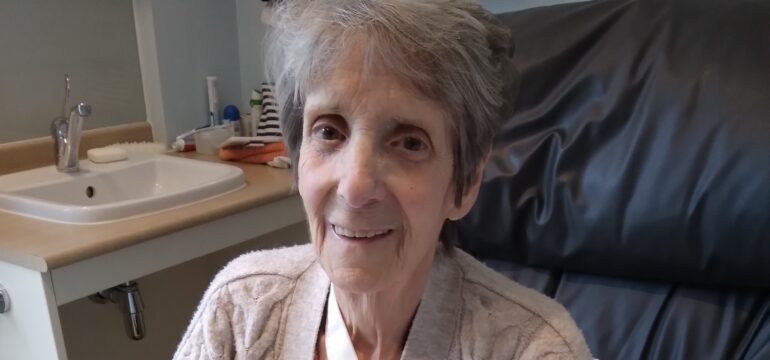
“It was bad news, I was terminal – there was nothing they could do for me. The treatment was making me more poorly. So, when I got home to my family, you can imagine the reaction.”
Jenny, 78, from Hindley is being cared for on our Inpatient Unit where her symptoms are being managed and her pain being treated.
Ovarian cancer
Great-grandmother Jenny is living with ovarian cancer and is in the hospice for a short stay until she is well enough to go home.
Former cook Jenny discovered she had ovarian cancer in May 2021 at an appointment when she was joined by her granddaughter Katie. By the time the cancer was identified it had spread to her stomach lining.
She had been suffering with pains in her chest for some time but was initially told it was likely she had pulled a muscle.
She said: “I didn’t get lumps or pain where you might expect – it was pains in my chest. I was told I had pulled muscles at first, so I took it for granted there was nothing there, but as time progressed I went worse and worse. My daughter was over for Sunday dinner one week and she said I’d been complaining about the pains for a while and we needed to do something about them.
“I went to see my GP and she said she’d send me to a specialist and I had a biopsy. By this time I was being sick all the time – it was terrible – so they rushed to get my results. I spent ten days in Wigan Infirmary for tests before going home. Then they phoned to say they had news. I had an idea it was cancer.
“I was OK at first, I accepted that I wasn’t going to get better and would get worse. It was devastating news. I was scared of telling my family what had happened because we’ve had so many tragedies.”
Jenny began a programme of chemotherapy and was halfway through a second course when in March 2022 she was told her diagnosis was terminal.
Going to the hospice
Jenny came into the hospice because of pain and symptoms associated with her cancer. The staff have reassessed her medication and put her on a syringe driver which is a non-invasive way of taking medication and means she does not need to take tablets until her swallowing improves.
“I feel a lot better now they are treating me in the hospice,” said Jenny. “I was taking tablets but my throat is very dry so for now I’m on a syringe driver. That will be taken away soon and I’ll be back on the tablets.
“The hospice has really helped me a lot. When I came in I was in pain with my stomach and in my back near the bottom of my lungs. I had pain in different places and most of the pain has disappeared now. The only pain that remains is where I need fluid draining away, which I get done every six weeks.
“The care here has been absolutely marvellous and the staff; I don’t know how I can explain my gratitude. Even the food is good and the staff look after you in every way – nothing is too much.
“I will have been here three weeks on Wednesday and it has been like being waited on in a hotel all that time.”
Jenny married Tommy (now 82) in 1964 and they had four children: Philip, Susan, Anita and Lisa. The couple have eight grandchildren and have five great-children
Joe
Jenny first came into contact with the hospice in 2019 when the hospice cared for her grandson, Joe Jolley. Joe had a brain tumour and spent a week being cared for in the hospice before he passed away aged just 24 years old surrounded by family, including Jenny.
Jenny said: “The staff were marvellous with him. They made us feel comfortable and calmed us down when we were upset.
“I want to come in here when it’s the end of my life if it’s possible because it has been so nice.
“People think you come in a hospice and that’s the end but it isn’t. The hospice is great and it needs our support.”
Fundraising
Since Joe died the family have done a great deal of fundraising for the hospice and are planning on doing more including an event to mark what would have been Joe’s birthday in May.
Jenny’s mum had ovarian cancer but at the time it was not recognised and Jenny’s family were initially told she had died of a heart attack. She is keen to raise awareness. The main symptoms are of a swollen tummy/feeling bloated; pain or tenderness in your tummy, reduced appetite and a need to visit the toilet more often.
Written in January 2023